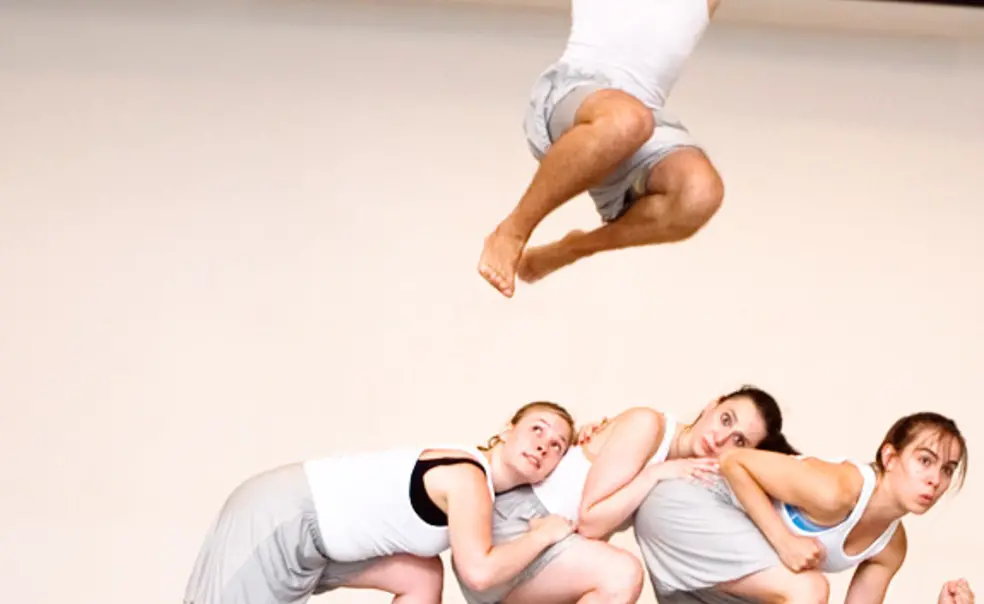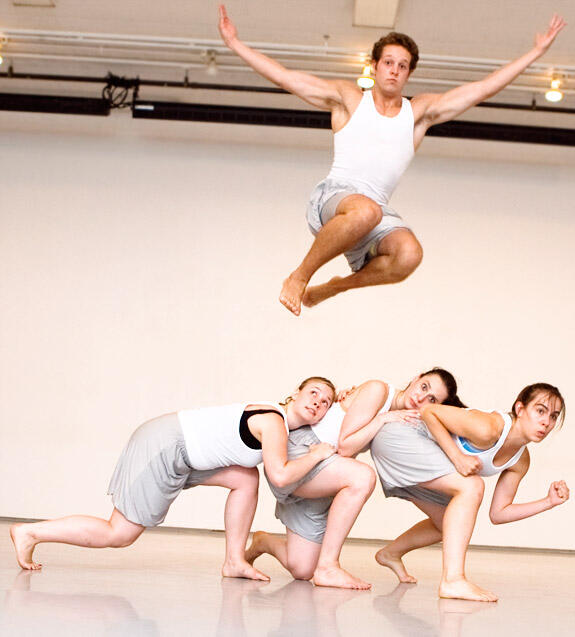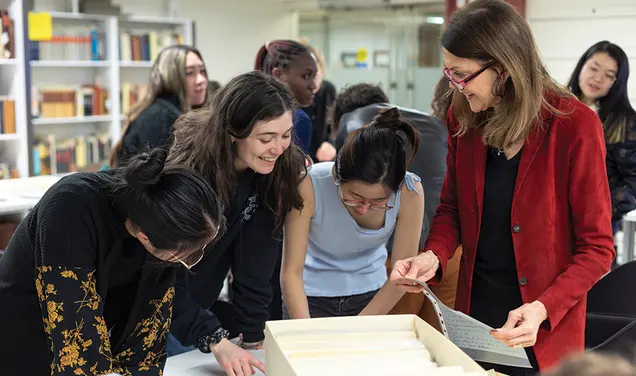Prokofiev's 'Music for Athletes'
Russian work premieres with a Princeton spin
Peter Schram ’09 leaps over, from left, Kelsey Berry ’10, Jennie Scholick ’09, and Elizabeth Schwall ’09 in a rehearsal for Music for Athletes. (Photo by Brian Wilson, Princeton University Office of Communications) |
"Greetings, highest President Tilghman! And three cheers for Old Nassau!"
These are the cries that opened the world premiere of Russian composer Sergei Prokofiev's Music for Athletes in Richardson Auditorium July 17. The piece, which Princeton music professor Simon Morrison *97 uncovered in 2006 at the Russian State Archive of Literature and Art in Moscow, was performed as part of the sixth annual Golandsky Institute International Piano Festival.
Russian-born pianist Ilya Itin played the music, while a Princeton undergraduate and three alumni -- Kelsey Berry ’10, Peter Schram ’09, Elizabeth Schwall ’09, and Jennie Scholick ’09 -- danced to Scholick's original choreography.
The "greetings" to Tilghman are representative of Scholick's concept for the piece. Playing on the Kremlin's original intention of glorifying Soviet athletic prowess through the performance, her modern adaptation glorifies Princeton instead.
Commissioned by the Leningrad Institute of Physical Culture, Music for Athletes was supposed to premiere in the summer of 1939, accompanied by 30,000 athletes demonstrating feats of paramilitary skill. Prokofiev composed the six numbers that comprise Music for Athletes in one week. Yet the June 1939 arrest of director and choreographer Vsevolod Meyerhold -- who later was interrogated and executed as part of the Great Terror -- put a halt to the production, which went unperformed and was lost in the archives.
Morrison, who discovered the piece while researching his newly released book on Prokofiev (The People's Artist: Prokofiev's Soviet Years), worked with graduate student Laura Hedden to restore and prepare it for a Princeton debut. Morrison has led the production of two other Prokofiev world premieres at Princeton: Boris Godunov in 2007, and the ballet Le Pas d'Acier (The Steel Step) in 2005. He has plans to orchestrate the score of Music for Athletes, following Prokofiev's original instructions, for a future performance at Princeton.
Golandsky Institute creative partner Adrienne Sirken described Music for Athletes as "a tremendous lot of fun despite the thorny political context of its creation." Morrison, who was scheduled to speak at the performance but had to travel to Moscow, said in an e-mail that "its post-Soviet revival would have delighted Prokofiev, who never considered his music to be connected to any one time and place. He correctly perceived that his art would outlast the circumstances of its conception, that it would be, as it were, eternal."
In Scholick's adaptation, the dancers wore orange stars (rather than the Soviet-style red star) on black tank tops as they leapt about the stage in feats of "athletic prowess." At times, Schram walked on stage waving a giant Princeton banner back and forth over his head as the others danced around him. They maintained a light-hearted tone throughout the display: In one sequence, Berry, Schwall, and Scholick struggled to lift a ballet bar for several minutes. As they despaired over their weakness, Schram strode in bearing an identical bar high above his head. He proceeded to spin the bar (which was draped with a bright orange Princeton banner) in the air, striking a series of athletic poses. Other sequences in the 17-minute performance involved hula-hoop acrobatics and mock sword fighting.
A performance of Prokofiev's Peter and the Wolf followed Music for Athletes. While Itin played the piano, poet and Princeton professor Paul Muldoon read the narrative. Itin ended with Prokofiev's "Piano Sonata No. 7." By Emily M. Silk ’10
Related story: "Unmasking Prokofiev," PAW's Sept. 26, 2007, profile of Simon Morrison *97











No responses yet